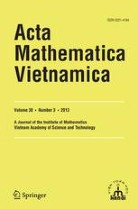
Acta Mathematica Vietnamica
- Volume 50
- Volume 49
- Volume 48
- Volume 47
- Volume 46
- Volume 45
- Volume 44
- Volume 43
- Volume 42
- Volume 41
- Volume 40
- Volume 39
- Volume 38
- Volume 37
- Volume 36
- Volume 35
- Volume 34
- Volume 33
- Volume 32
- Volume 31
- Volume 30
- Volume 29
- Volume 28
- Volume 27
- Volume 26
- Volume 25
- Volume 24
- Volume 23
- Volume 22
- Volume 21
- Volume 20
- Volume 19
- Volume 18
- Volume 17
- Volume 16
- Volume 15
- Volume 14
- Volume 13
- Volume 12
- Volume 11
- Volume 10
- Volume 9
- Volume 8
- Volume 7
- Volume 6
- Volume 5
- Volume 4
- Volume 3
- Volume 2
- Volume 1
CHU SPACES AND CONDITIONAL PROBABILITY
NGUYEN NHUY, NGUYEN VAN QUANG
Abstract
Let $\widetilde{\Omega}=(\Omega, P, \mathcal A)$ and $\widetilde{\Sigma}=(\Sigma, Q, \mathcal B)$ be probability measure spaces, and let $\phi:\Omega\to\Sigma$ and $\psi:\Sigma\to\Omega$ be measurability preserving maps. The maps $\phi$ and $\psi$ induce $\phi^{-1}:\mathcal B\to\mathcal A$ and $\psi^{-1}:\mathcal A\to\mathcal B$. By $(\mathcal A,\mathcal A,f)$ we denote the Chu space associated with the probability measure space $(\Omega,P,\mathcal A)$. Our main results are:
Theorem 1. Let $P(\widetilde{\Omega})=(\mathcal A, \mathcal A, f)$ and $P(\widetilde{\Sigma})=(\mathcal B,\mathcal B, g)$ be Chu spaces associated with $\widetilde{\Omega}$ and $\widetilde{\Sigma}$, respectively. If $\Phi=(\psi^{-1}, \phi^{-1}):P(\widetilde{\Omega})\to P(\widetilde{\Sigma})$ is a Chu morphism, then both $\phi$ and $\psi$ are measure preserving.
Theorem 2. The pair $(\phi, \psi)$ is mutually measure preserving if and only if $\Phi=(\psi^{-1}, \phi^{-1}):(\mathcal A,\mathcal A, f)\to (\mathcal B, \mathcal B, g)$ is a Chu morphism.


